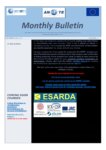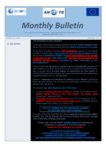ANNETTE: Advanced Networking for Nuclear Education, Training and Transfer of Expertise
The aim of the ANNETTE project was to consolidate existing achievements and to tackle the challenges in ensuring a qualified nuclear workforce is available to support future nuclear energy, decommissioning and waste management requirements. The project delivered a number of reports exploring the needs of the sector and facilitated a number of networking events and the production of learning materials.
Overview
Project Dates: 1/1/2016 – 31/12/2019
Project Status: Finished
Project Website: www.annette.eu
The situation of nuclear energy in Europe requires a continuing effort in the field of Education and Training (E&T) and Vocational Education and Training (VET) to ensure a qualified workforce is available in the next decades.
ANNETTE aimed to enhance Europe-wide efforts initiated in previous decades by different organisations belonging to academia, research centres and industry to maintain and develop education and training in the different nuclear areas. The main aim of the project was to consolidate and better exploit the achievements already reached in the past and to tackle the present challenges in preparing the European workforce in the different nuclear areas, with special attention to continuous professional development, life-long learning and cross-border mobility.
The European Nuclear Education Network (ENEN) was the co-ordinator of the project, together with the other participants. The ANNETTE project was undertaken in line with the SET Plan Roadmap for Education and Training for the nuclear sector, tightening the links between the areas of nuclear safety/engineering, radiation protection, waste management and geological disposal at the same time and better coordinating their contributions in the E&T fields.
ANNETTE was a four-year project funded by the EU’s Horizon 2020 research and innovation programme.
Objective
The main objectives of ANNETTE were:
- the survey and co-ordination of networking in E&T and VET in the nuclear areas;
- the design and implementation of co-ordinated E&T and VET efforts (Master and Summer Courses for continuous professional development);
- to facilitate generational transfer of expertise (sustainable production of educational material);
- cross border transfer of expertise (implementation of ECVET based exchanges among industrial bodies);
- reinforcing ETI actions for sharing and enhancing nuclear safety culture competence; and
- facilitation of the nuclear transition in fusion (co-ordinating E&T actions).
Results
The ANNETTE project delivered a number of reports focused on E&T and VET in the nuclear sector. These reports included:
- a survey on the state of the art in E&T and VET in the nuclear fields;
- an analysis of the creation of sustainable advanced networking in nuclear education training and transfer of expertise;
- a report on the implementation of European certifications for E&T and VET in relevant nuclear domains; and
- a report on available nuclear facilities in support of Life Long Learning.
ANNETTE also delivered a number of events including workshops and networking events; these included:
- the ANNETTE Project Open Workshop at NESTet 2016 Conference (2016);
- an academic Session Celebrating 15 Years of the ENEN Association (2018);
- ENEN and ANNETTE Stakeholder Event (2019);
- E&T networking event at FISA 2019: “Nuclear Education: A Cause for Concern?” (2019); and
- the ANNETTE Summer School on Nuclear Technology, Nuclear Waste Management and Radiation Protection (2018).
Finally, ANNETTE coordinated the development of a number of E&T materials in a variety of formats including slides, videos and textbooks. The titles of the prepared learning materials are:
- Back–end of the nuclear fuel cycle: an overview
- Nuclear energy: Life cycle
- History of nuclear safeguards
- Non–destructive assay
- The nuclear fuel cycle
- Introduction to nuclear safeguards
- Introduction to Nuclear Security: Regulations and delivery
- Uncertainty quantification in risk modelling for radioactive waste disposal
- Geological disposal: Site selection
- Geological disposal: Radionuclide transport in porous media



























